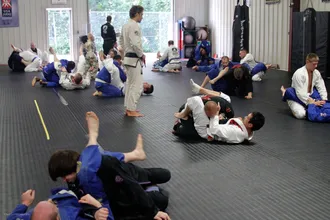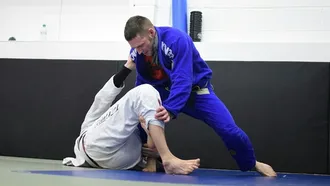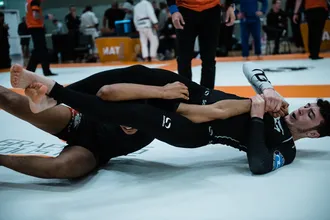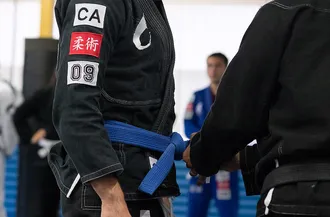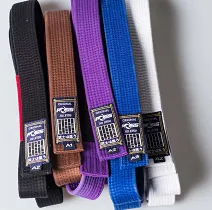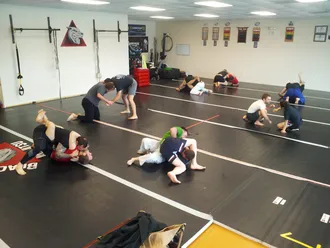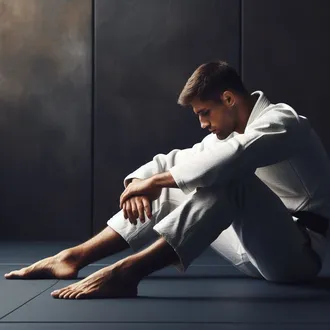
Hey BJJ enthusiasts! Whether you're brand new to the mats or a seasoned grappler looking to improve, you’ve probably asked yourself: "How often should I train BJJ?" or "How can I get better at BJJ?"
Finding the right balance between training frequency, recovery, and technical improvement is key to long-term success. But there’s no one-size-fits-all answer—your ideal schedule depends on your goals, experience level, and lifestyle.
In this guide, we’ll break down how often you should train BJJ based on your skill level and give you actionable strategies to get better at BJJ faster and more effectively.
How Often Should I Train BJJ? Finding the Right Training Frequency
Brazilian Jiu-Jitsu isn't just any martial art; it's a blend of tactical thinking, physical prowess, and mental resilience. Finding the ideal training frequency is more art than science, influenced by your current skill level, what goals you're aiming to achieve, and, of course, your physical fitness.
It's about striking a balance – train BJJ too little, and you might find your progress stalling or stagnating; train BJJ too much, and you're looking at a one-way ticket to Burnout City.
Remember, no two BJJ journeys are the same. Some train for fun, others for fitness, self-defense, or even to boost confidence. And while not everyone is aiming to be a fierce competitor, we recommend giving competition a try at least once to see what you’re capable of!
Your reasons for BJJ training followed by your personal life, job and commitments will likely be the main factors in how often you can train regularly. Followed closely by your BJJ goals and the amount of experience training that you already have.
BJJ Training Frequency Guide: How Many Days a Week Should You Train?
- Training 1-2 Times a Week: Ideal for beginners, casual practitioners, and those balancing BJJ with other commitments. This schedule allows you to ease into the sport without overwhelming your body.
- Training 3-4 Times a Week: Perfect for intermediate students looking for consistent progress. At this level, you can focus on developing positional awareness and refining techniques.
- Training 5+ Times a Week: For competitors and more serious practitioners aiming for rapid improvement. With more frequent training, often multiple times daily, recovery and injury prevention become critical factors.
How long does it take to learn Brazilian Jiu Jitsu?
The timeline for learning Brazilian Jiu-Jitsu varies widely depending on factors such as natural aptitude, frequency of training, and individual goals.
Generally, most people can expect to develop a foundation within the first six months to a year of consistent BJJ training. Building muscle memory by gaining proficiency in basic techniques and grappling principles, based on how many days they can train.
Keep in mind that mastery is an ongoing journey that evolves over years of dedicated practice. Even the most seasoned of practitioners are still continually refining their skills, expanding their knowledge, and adapting to new challenges and techniques on the mats.
Starting Out – The Beginner's Journey
If you’re just starting your BJJ journey, remember: consistency is your best friend.
Can You Start BJJ If You’re Older?
Absolutely! Jiu-Jitsu isn’t just for young athletes—many people start in their 30s, 40s, or even 50s and still make incredible progress.
The key to training at an older age is smart training. Unlike younger practitioners who can recover quickly from hard sparring, you’ll want to focus on:
- Technical Efficiency: Rely on leverage and technique rather than athleticism.
- Injury Prevention: Prioritize warm-ups, mobility exercises, and tapping early to stay injury-free.
- Recovery Time: Allow yourself extra rest between sessions and listen to your body.
Many successful BJJ practitioners started later in life and still achieved black belt. The most important thing? Stay consistent, train smart, and enjoy the process!
Begin with one to two BJJ classes a week. Each session usually lasts about an hour to an hour and a half. This steady pace helps you progress steadily, get in shape, and let your body adjust to BJJ’s unique challenges.
It's all about laying down a solid foundation in the basics and building up your skills steadily. Rushing into too many hours too soon can be overwhelming and counterproductive.
Building Up – The Intermediate Path
As you find your footing and move into the intermediate phase, your body starts getting the hang of the BJJ grind.
Now, you might want to up the ante a bit – think about aiming for three to four sessions per week, training in both Gi and No-Gi.
But remember, it's a long journey, a marathon, not a sprint. Increasing your training frequency should be a gradual shift to avoid overtraining and the risk of injuries that come with it.
Should You Train Both Gi and No-Gi BJJ?
Training in both Gi and No-Gi BJJ offers different benefits that can improve your overall game.
- Gi Training: Helps develop grip strength, patience, and precise control. Techniques tend to be more methodical due to the ability to control and slow down your opponent.
- No-Gi Training: Emphasizes speed, transitions, and scramble ability. Since grips aren’t as strong, it forces you to rely on positioning and body mechanics.
- Training Both: Builds a more complete grappling style. Many top competitors train both to become well-rounded in different rule sets and adapt to any opponent.
Advanced Training – Balancing Intensity and Recovery
For the advanced practitioners out there already at a high level, you're likely hitting the mats multiple times a week, even twice a day if your schedule allows it.
At this level, the intensity of your training and involvement sparring sessions and open mats naturally ramps up.
However, it's crucial to remember that with great intensity comes the need for great recovery. Balancing hard training with adequate rest is key to your BJJ longevity. Listen to your body and don't skimp on those rest days – they're just as important as your training days.
Considerations for Your Training Frequency
When deciding how often to train BJJ, it's not just about showing up—it's about training smart. Recovery, training quality, and expert guidance all play a crucial role in maximizing progress while avoiding setbacks.
1. Importance of Rest and Recovery
Rest isn’t just a break from training—it’s when your body actually builds strength and improves. Without proper recovery, fatigue accumulates, leading to burnout and injuries.
- 🩻 Listen to Your Body: If you’re constantly sore or feeling sluggish, you might be overtraining.
- 😴 Prioritize Sleep: Quality sleep is one of the most important factors for muscle recovery and performance.
- 🥗 Fuel Your Body: Eating the right foods and staying hydrated ensures your body can recover and perform at its best.
- 🧘 Active Recovery: Light movement like yoga, stretching, or mobility drills can help speed up recovery without overloading your body.
⚠️ Overtraining doesn’t make you better—smart training does. Make sure to schedule in rest days to keep yourself on the mats long-term.
2. Quality Over Quantity: Avoid Overtraining
Training more doesn’t always mean training smarter. It’s better to have fewer, focused sessions than to overtrain and risk burnout.
- 🚦 Recognize Early Signs of Overtraining: Fatigue, lack of motivation, and constant soreness can indicate you're pushing too hard.
- ⚖️ Balance Hard and Light Days: Not every session should be intense. Some should focus on drilling and technique refinement.
- 🛌 Take Rest Days Seriously: Recovery is essential. Muscles and joints need time to repair to prevent long-term damage.
🎯 Instead of trying to cram in more sessions, focus on maximizing what you learn in each session.
3. Seeking Guidance: Structuring Your Training
Having a well-structured training plan is crucial for progress. Instead of training randomly, seek guidance to develop a plan that works for you.
- 👨🏫 Work with Your Instructor: Ask your coach about structuring your training based on your skill level and goals.
- 🤝 Find a Training Partner: Working with a dedicated partner can accelerate learning through focused drilling and positional sparring.
- 🎥 Watch & Learn: Studying high-level matches or instructionals can help you absorb concepts that might take months to figure out on your own.
🏆 Having structure in your training will help you make steady progress while minimizing bad habits.
How to Get Better at BJJ: Essential Tips for Faster Progress
Improving your BJJ skills isn’t just about increasing training hours – it’s about training smarter. Below are key strategies to help you get better at BJJ and maximize your time on the mats.
1. Focus on Technique: The Power of Drilling
Drilling is one of the fastest ways to improve your BJJ skills. Repetition builds muscle memory, making movements second nature during live rolling.
- Drill techniques slowly and with precision before increasing speed.
- Perform positional drilling with a training partner to reinforce key movements.
- Set a goal of drilling each technique at least 50 times per session.
2. Quality Over Quantity: Train Smarter, Not Just More
Attending multiple classes per week is great, but mindless training won’t help you progress. Instead, focus on the quality of your sessions.
- Approach each session with a learning goal (e.g., improving guard retention).
- Take mental notes after class and reflect on what worked and what didn’t.
- Use positional sparring to sharpen specific skills.
3. Review and Reflect: Learn from Your Training Sessions
To get better at BJJ faster, analyze your own performance and make adjustments.
- Record and review your sparring sessions to spot weaknesses.
- Study instructional videos and compare them to your own movements.
- Keep a BJJ journal to track techniques learned and areas for improvement.
4. Ask for Feedback: Leverage Your Coaches and Training Partners
One of the best ways to accelerate improvement is to get guidance from those more experienced.
- Regularly ask your instructor for feedback on your technique.
- Train with higher belts and request tips after rolling.
- Be open to constructive criticism and apply what you learn.
5. Cross-Train: Strength and Conditioning for BJJ
Complementing your BJJ practice with strength and conditioning can significantly improve performance.
- Focus on flexibility and mobility exercises to prevent injuries.
- Incorporate strength training (bodyweight exercises, kettlebells, resistance bands).
- Improve endurance with cardio workouts like swimming or running.
6. Develop a Strong Mindset: Patience and Persistence
Jiu-Jitsu is a long journey, and mental resilience plays a huge role in progress.
- Don’t get discouraged by plateaus – improvement comes in phases.
- Stay consistent even on days when training feels frustrating.
- Set short-term and long-term goals to keep yourself motivated.
Conclusion
In wrapping up, remember that there's no universal answer to how often you should train in BJJ each week. It's all about finding the right balance that works for you, considering your experience level, personal goals, and your lifestyle.
Remember: Any Jiu-Jitsu is better than no Jiu-Jitsu!
If you can only train once a week, then do it! Your circumstances may change overtime, and as you grown into the sport you will find yourself with more opportunities to train - long term progress is inevitable.
Consistency, quality training, and allowing time for recovery are the pillars of success in Brazilian Jiu-Jitsu. Keep these in mind, and you're well on your way to black belt.

